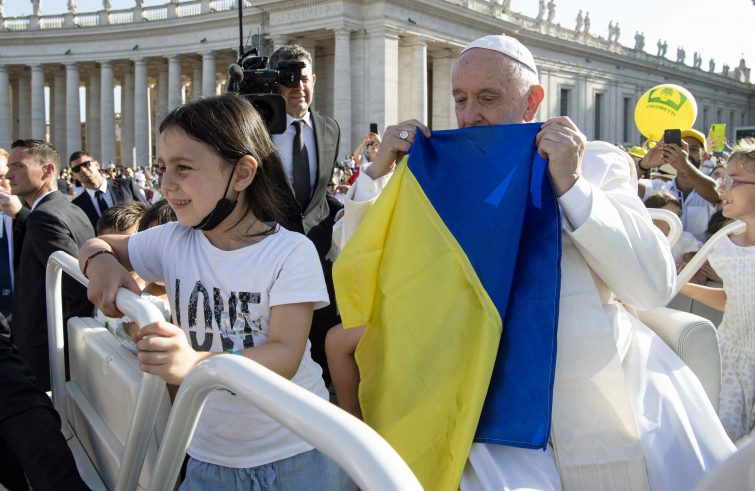
“At the very moment when we dared to hope that the darkest hours of the Covid-19 pandemic were over, a terrible new disaster befell humanity.” In just over two pages and five points Pope Francis’ Message for the World Day of Peace, celebrated on January 1st, covers two focal issues: the pandemic and the war in Ukraine. The Pontiff retraces the first days of the pandemic with its tragedies, which plunged humanity “into a dark night.” It “disrupted the apparent tranquility of even the most affluent societies. It generated disorientation and suffering and caused the death of great numbers of our brothers and sisters.”
In the words of the Pope we also find the twofold impact of the pandemic: “In addition to its physical aspects, Covid-19 led to a general malaise in many individuals and families; the long periods of isolation and the various restrictions on freedom contributed to this malaise, with significant long-term effects.” This awareness extends to the fact that “the pandemic exposed” the “fractures in our social and economic order, and brought to the fore contradictions and inequalities.” “It threatened the job security of many individuals and aggravated the ever-increasing problem of loneliness in our societies, particularly on the part of the poor and those in need”, Francis said referring to “informal workers.” A crisis that affected everyone:
“The pandemic seems to have upset even the most peaceful parts of our world, and exposed any number of forms of fragility.”
Time for answers. The Pope highlights a set of questions that need an answer after three years. He points them out one by one: “I have already observed on a number of occasions that we never emerge the same from times of crisis: we emerge either better or worse. Today we are being asked: What did we learn from the pandemic? What new paths should we follow to cast off the shackles of our old habits, to be better prepared, to dare new things? What signs of life and hope can we see, to help us move forward and try to make our world a better place?”.
Against this backdrop, the Holy Father indicates a certainty:
“The greatest lesson we learned from Covid-19 was the realization that we all need one another. That our greatest and yet most fragile treasure is our shared humanity as brothers and sisters, children of God. And that none of us can be saved alone.”
On his part, Francis underlines that “we urgently need to join together in seeking and promoting the universal values that can guide the growth of this human fraternity.” “We also learned that the trust we put in progress, technology and the effects of globalization was not only excessive, but turned into an individualistic and idolatrous intoxication, compromising the very promise of justice, harmony and peace that we so ardently sought.” “In our fast-paced world, the widespread problems of inequality, injustice, poverty and marginalization continue to fuel unrest and conflict, and generate violence and even wars.” Finally, the “positive effects” brought by the pandemic: “A chastened return to humility, a rethinking of certain consumeristic excesses, and a renewed sense of solidarity that has made us more sensitive to the suffering of others and more responsive to their needs. We can also think of the efforts, which in some cases proved truly heroic, made by all those people who worked tirelessly to help everyone emerge from the crisis and its turmoil as best they could.”
The war in Ukraine. The other theme of the message is inevitably the war in Ukraine. “We witnessed the onslaught of another scourge: another war, to some extent like that of Covid-19, but driven by culpable human decisions – Francis remarked -. The war in Ukraine is reaping innocent victims and spreading insecurity, not only among those directly affected, but in a widespread and indiscriminate way for everyone, also for those who, even thousands of kilometres away, suffer its collateral effects – we need but think of grain shortages and fuel prices. Clearly, this is not the post-Covid era we had hoped for or expected.”The Pope emphasizes that this war, “together with all the other conflicts around the globe, represents a setback for the whole of humanity and not merely for the parties directly involved.” “While a vaccine has been found for Covid-19, suitable solutions have not yet been found for the war. Certainly, the virus of war is more difficult to overcome than the viruses that compromise our bodies, because it comes, not from outside of us, but from within the human heart corrupted by sin.” The gaze turns to what should be done now. There is one certainty:
“We can no longer think exclusively of carving out space for our personal or national interests; instead, we must think in terms of the common good, recognizing that we belong to a greater community, and opening our minds and hearts to universal human fraternity”.










